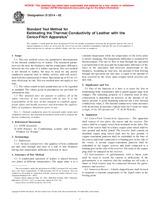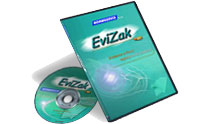Potřebujeme váš souhlas k využití jednotlivých dat, aby se vám mimo jiné mohly ukazovat informace týkající se vašich zájmů. Souhlas udělíte kliknutím na tlačítko „OK“.
ASTM D2214-02
Standard Test Method for Estimating the Thermal Conductivity of Leather with the Cenco-Fitch Apparatus (Withdrawn 2008)
Automaticky přeložený název:
Standardní zkušební metoda pro odhad tepelnou vodivost kůže s Cenco - Fitch aparátu (Withdrawn 2008 )
NORMA vydána dne 10.9.2002
Informace o normě:
Označení normy: ASTM D2214-02
Poznámka: NEPLATNÁ
Datum vydání normy: 10.9.2002
Kód zboží: NS-19637
Počet stran: 3
Přibližná hmotnost: 9 g (0.02 liber)
Země: Americká technická norma
Kategorie: Technické normy ASTM
Anotace textu normy ASTM D2214-02 :
Keywords:
insulating, leather, thermal conductivity, ICS Number Code 59.140.30 (Leather and furs)
Doplňující informace
| Significance and Use |
|
Part of the function of a shoe is to assist the foot in maintaining body temperature and to guard against large heat changes. The insulating property of a material used in shoe construction is dependent on porosity or the amount of air spaces present. A good insulating material has a low thermal conductivity value, k. The thermal conductivity value increases with an increase in moisture content since the k value for water is high, 14 by 104cal·cm/s·cm4 · °C (0.59 W/m·K). |
| 1. Scope |
|
1.1 This test method covers the quantitative determination of the thermal conductivity of leather. The measured parameters are the area, the thickness, and the temperature difference between the two sides of a leather specimen. This test method is not limited to leather, but may be used for any poorly conductive material such as rubber, textiles, and cork associated with the construction of shoes. Specimens up to 0.5 in. (13 mm) thick may be run. This test method does not apply to wet blue. 1.2 The values stated in inch-pound units are to be regarded as standard. The values given in parentheses are provided for information only. 1.3 This standard does not purport to address all of the safety concerns, if any, associated with its use. It is the responsibility of the user of this standard to establish appropriate safety and health practices and determine the applicability of regulatory limitations prior to use. Note 1—Thermal conductivity must be measured under steady-state conditions; however, this transient test method can be used to estimate the thermal conductivity of leather. |
Doporučujeme:
EviZak - všechny zákony včetně jejich evidence na jednom místě
Poskytování aktuálních informací o legislativních předpisech vyhlášených ve Sbírce zákonů od roku 1945.
Aktualizace 2x v měsíci !
Chcete vědět více informací? Podívejte se na tuto stránku.




 Cookies
Cookies
